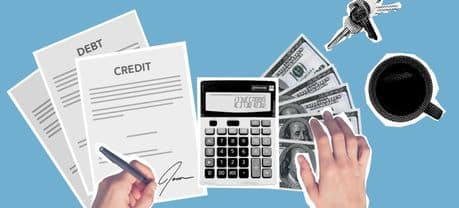How to Catch Up on Bills (When Money Is Tight)
When your money is tight, you need to learn how to catch up on bills before you fall too far behind, which can be detrimental to your finances!
With these tips, you will learn exactly how to pay your bills on time so you will never have a late payment again.
Falling behind on bill payments can be overwhelming, but taking steps to catch up and regain control of your finances is important.
Let’s get into the best strategies and tips on how to catch up on bills quickly and effectively…
Key Takeaways
- Make a list of bills missed and those coming due soon to prioritize them.
- Communicate with your creditors about your financial struggles and explore flexibility with repayment plans.
- Create a budget to track your income and expenses, focusing on reducing variable costs and cutting out extras.
- Be cautious of debt relief services and prioritize saving and debt repayment.
Organizing Your Bills and Prioritizing Payments

When you fall behind on bills, getting organized and prioritizing your payments is crucial. By taking a systematic approach, you can effectively catch up on overdue bills and regain control of your financial situation.
Here are some strategies to help you manage your overdue bills and get back on track:
- Create a comprehensive list: List all the bills you owe, including the amount and due dates. A clear overview will help you identify which bills are most urgent and require immediate attention.
- Order bills by importance: Once you have your list, prioritize your payments by importance. Focus on bills necessary for your basic needs, such as rent or mortgage, food, and utilities. Meeting these essential expenses is crucial to maintaining stability.
- Be aware of missed payments: Take note of any missed payments that could lead to legal or financial trouble. It’s essential to address these immediately to avoid further consequences.
By organizing your bills and prioritizing payments, you can start catching up and progressing toward financial stability.
Communicating with Creditors and Exploring Flexibility

When it comes to catching up on bills, one of the most critical steps is communicating with your creditors. Reach out to them and explain your current financial situation.
You can often find solutions that work for you both by talking to your creditors directly. They may be willing to offer flexibility with your repayment plans, such as changing the terms or reducing penalties.
This open line of communication can help you avoid falling further behind and damaging your credit standing.
Don’t feel embarrassed to ask for help! These creditors are often willing to work with you so you can make your payments, so it doesn’t hurt to ask what they can do to help you out.
It’s crucial not to ignore your bills and pretend they will disappear. Ignoring bills only leads to more penalties, higher interest rates, and additional stress.
By actively engaging with your creditors, you take control of the situation and show your commitment to resolving your financial obligations.
In some cases, exploring debt relief options may be necessary. Debt consolidation, for example, can combine multiple debts into one monthly payment, potentially reducing the overall interest rate and making repayment more manageable.
However…
Before deciding, thoroughly researching any debt settlement companies or services is essential. Look for reputable organizations and read reviews from consumers who have used their services to ensure you make an informed choice.
Here are some tips for talking to creditors and managing your bills
- Be proactive: Don’t wait until you’re overwhelmed with bills. Reach out to your creditors when you realize you may have trouble making payments. They are often more willing to work with you if you address the situation early.
- Know your options: Before contacting your creditors, gather all the information about your debts and your current financial situation. This will allow you to have a more productive conversation and explore the best possible solutions.
- Be honest and transparent: When speaking with your creditors, be honest about your financial difficulties. Provide them with accurate information about your income, expenses, and any challenges you’re facing. This will help them understand your situation better and offer appropriate solutions.
- Stay organized: Keep track of your communication with creditors, including dates, names of representatives you spoke with, and any agreements or arrangements made. This can help avoid misunderstandings and provide documentation if needed in the future.
Remember…
Communication is vital when it comes to catching up on bills. By talking to your creditors and exploring flexibility, you can find solutions that work for both parties and take steps toward regaining your financial stability.
Creating a Budget and Tracking Your Spending

Creating a budget and tracking your spending is essential to catch up on bills effectively. This will help you understand your financial situation and make informed decisions about your expenses.
Here are some tips to help you get started:
Determine your monthly income and expenses
- List all your sources of income, including wages, freelancing, or any other sources.
- Make a detailed list of your expenses, including fixed costs like rent or mortgage payments, utilities, transportation, and variable costs like groceries, entertainment, and dining out.
Prioritize critical expenses
- Identify the essential expenses for your basic needs, such as housing, food, and utilities.
- Pay these critical expenses first to ensure your essential needs are met.
Reduce unnecessary expenses
- Review your variable expenses and identify areas where you can cut back, such as dining out less frequently, canceling unused subscriptions, or finding more cost-effective alternatives.
- Look for ways to save on your fixed expenses, like renegotiating your cable or internet bill.
Track your spending
- Use budgeting tools or apps to track your income and expenses.
- Regularly review your spending habits and adjust your budget as needed.
By creating a budget and tracking your spending, you can allocate your money effectively, reduce unnecessary expenses, and progress in catching up on bills.
Be Cautious of Debt Relief Services

When managing bills and struggling to catch up on payments, it’s crucial to approach debt relief services cautiously.
While debt settlement companies may promise enticing deals to help you get out of debt, it’s crucial to read their offers carefully and understand how your debt will be reported to credit agencies.
Before making any decisions, thoroughly research any debt settlement company you’re considering and take the time to review consumer complaints against them.
Debt relief services can offer various options, such as bill consolidation, which can help simplify your payments. However, it’s important to remember that these services may come with risks and fees.
Before considering debt relief services, exploring other strategies for catching up on bills is wise. By prioritizing communication with creditors, creating a budget, and exploring flexible repayment plans, you can make progress on your own.
Remember that there is no one-size-fits-all solution for managing bills and debt. Each person’s financial situation is unique, and what works for one person may not work for another.
Take the time to assess your circumstances and make decisions that align with your long-term financial goals.
By being cautious and informed, you can make the best choices for your financial well-being.
Building an Emergency Fund and Saving for the Future

As part of catching up on bills, it’s essential to prioritize building an emergency fund and saving for the future.
By setting aside a portion of your income, you can build a safety net that will help you weather unexpected expenses without falling behind on your bills.
Aim to save around 20% of your income, but start with smaller, achievable goals if necessary.
Here are some steps to help you establish an emergency fund:
- Create a budget: Determine your monthly income and expenses to identify areas where you can cut back and allocate more towards savings.
- Start small: Start with a starter emergency fund covering minor emergencies and repairs. Aim to save at least $1,000 initially.
- Gradually build your fund: Once you have a starter emergency fund, save three to six months’ worth of essential living expenses. This will provide a safety net in case of job loss or unexpected financial challenges.
- Automate your savings: Set up automatic transfers from your checking account to your emergency fund to make saving a regular habit.
Additionally, it’s essential to consider saving for the future beyond emergencies. Consider retirement savings options, such as contributing to employer-sponsored 401(k) accounts or individual retirement accounts (IRAs).
These long-term savings strategies will help secure your financial future and provide peace of mind.
Automating Payments and Using Financial Software

Automating your payments and utilizing financial software can be game-changers when it comes to catching up on bills effectively.
By taking advantage of automatic bill payment options offered by your bill providers, you can ensure that your payments are made on time without any effort.
With this feature, the amount you owe will be automatically deducted from your bank account, eliminating the risk of missing due dates and incurring late fees. This helps you stay on top of your bills and simplifies the entire payment process.
In addition to automating payments, using financial software with bill reminders can further streamline your bill payment routine.
These software solutions allow you to set up payment reminders, never to miss a due date again. You can stay organized and avoid the stress of remembering multiple bill deadlines by receiving timely notifications.
Financial software also provides a centralized platform to manage and track your bill payments, giving you a comprehensive overview of your financial obligations.
Rocket Money
Rocket Money is one of the best financial software, and this app will take your finances to the next level!
The Rocket Money app (formerly Truebill) has many features such as managing bills, tracking spending, credit score and net worth tracking, credit score and net worth tracking, budgeting, etc…
This app is one of the best ways to catch up on bills since it does most of the work for you and will keep track of all of your finances!
Now, most of these features are only available with the premium plan, which does come with a cost, but the savings vastly outweigh the cost. The premium plan costs $4 – $12 a month; you can choose what you can afford to pay.
Plus…
One nifty feature that Rocket Money offers is they will negotiate with certain bill providers on your behalf to get a lower payment! Yes, for real, and this is a really neat feature!
For example, Rocket Money can work with your cell phone provider to get you a lower cost. However, this does come at a cost beyond the premium plan, they will take a percentage of your first year savings, between 30% – 60%.
Still, you get to save money on your bills, so this is pretty much a no-brainer!
I highly recommend using Rocket Money to manage your bills and improve your finances as a whole.
Ultimately, automating payments and utilizing financial software saves you time and effort and helps you maintain financial discipline.
You can avoid unnecessary fees and potential damage to your credit score by eliminating the risk of missing payments.
Consider incorporating these bill payment strategies into your routine, allowing you to catch up on bills efficiently and stay on top of your financial responsibilities.
Making Bill Payment a Habit

Making bill payments a habit is crucial to catch up on bills and maintain financial stability.
By incorporating bill payment strategies and effective budget management techniques into your routine, you can ensure that your bills are consistently paid on time.
Setting Bill Payment Reminders
One way to stay on top of your bill payments is to set reminders. Utilize financial software or calendar alerts to remind yourself of upcoming due dates.
This will help you avoid late fees and penalties and ensure you never miss a payment. Consider scheduling the reminders a few days in advance to give yourself enough time to gather the necessary funds.
Automating Payments
Another effective strategy is to automate your bill payments. Many bill providers offer automatic deduction options, allowing you to have the amount you owe automatically deducted from your bank account.
This eliminates the risk of forgetting or missing payments and the hassle of manually initiating transactions. Automating payments ensures that your allocated funds reach their intended purpose promptly.
Effective Budget Management
Managing your budget plays a crucial role in making bill payment a habit. Take the time to review your income and expenses regularly. Allocate a specific portion of your income to cover your bills, ensuring that you prioritize essential payments.
By setting aside funds specifically for bills and tracking your spending, you can ensure enough money is allocated for timely bill payments.
Conclusion
Now you know how to catch up on bills with the best tips out there!
Catching up on bills can feel overwhelming, but you can regain control of your financial health with the right strategies and determination. Here are some tips to help you effectively catch up on bills and improve your financial situation.
First, prioritize your bills by importance and communicate with your creditors. Reach out to them and explain your financial struggles. They may be willing to offer flexibility with repayment plans, which can ease your burden and help you stay on track.
Creating a budget is another essential step. Track your income and expenses, and identify areas where you can cut costs. By reducing unnecessary spending and prioritizing critical expenses, you can allocate more towards catching up on bills.
With these strategies in place, you’ll be on your way to catching up on bills and setting yourself up for a more secure financial future.
If you like this post, I recommend checking out my posts on 9 Bad Money Habits Keeping You Broke and Smart Spending Habits To Save More Money.
What do you think about these tips to catch up on bills? Do you have anything else to add? Let me know in the comments below!







